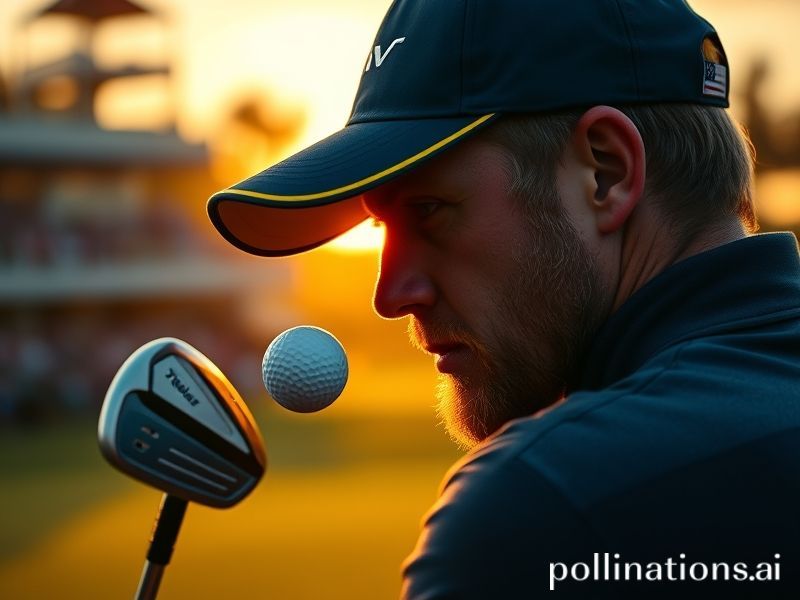Ludvig Åberg: The Swedish Golf Prodigy Quietly Reshaping Global Sport (While the World Argues About Everything Else)
The Swedish Meteor That Missed Every Radar Screen
By our correspondent in the bunker beneath Geneva’s Palais des Nations
GENEVA—In a week when the planet busied itself with the usual carousel of missile tests, crypto collapses, and whichever royal duchess is currently suing a tabloid, a 24-year-old from Esbjerg (yes, that’s in Denmark, but try telling the Swedes) quietly shot 64-64-65 to win the Scottish Open. Ludvig Åberg, a name that looks like a furniture line IKEA rejected for being “too minimalist,” has become golf’s first post-geopolitical star: unclaimed by any superpower, unbothered by sanctions, and apparently immune to jet lag.
The victory matters because it landed exactly halfway between the U.S. Congressional shouting match over whether golf is a national-security threat (spoiler: it is when the Saudis buy it) and the Paris Olympics, where the IOC will once again pretend that sport floats above politics like a helium balloon—right up until the first drone appears. Åberg’s ascent is thus a rare sliver of neutral airspace: a Nordic prodigy who chose college golf in Texas over oil-funded exhibitions in the desert, thereby enraging absolutely everyone with a vested interest in being enraged.
Global implications? Start with the fact that the European Ryder Cup team now possesses a human anti-tank missile who drives the ball 350 yards while exhibiting the emotional range of a tax auditor. Brooks Koepka, take note: the continent that gave you ABBA and existential dread has now weaponised both. Meanwhile, the PGA Tour’s grand plan to fend off LIV Golf involves… hoping its latest Netflix series can out-stream “Drive to Survive.” Good luck selling that subplot to a planet where half the audience can’t afford petrol.
Across Asia, where governments measure national prestige in Olympic gold and semiconductor yield, Åberg’s rise is being monitored like a 5G rollout. South Korean sports ministries have already dispatched scouts to the Nordic collegiate circuit, presumably on the theory that if Sweden can produce one, Seoul can mass-produce ten. China, still sulking that its home-grown golf boom fizzled the moment party cadres noticed the word “bourgeois,” is watching via VPN and pretending it doesn’t care—classic geopolitical ghosting.
Even Africa, a continent the golf-industrial complex treats with the same enthusiasm it reserves for biodegradable tees, sees symbolic value. Kenya’s sports minister, tweeting from an airport lounge between donor summits, hailed Åberg as proof “you don’t need a private jet to fly.” The minister was last seen boarding a private jet.
But the darkest chuckle comes from the climate desk. Åberg’s win happened at Renaissance Club, a linksland so close to the North Sea that greenskeepers keep snorkels handy. Scientists project that in 30 years the course will host the world’s first floating Ryder Cup—picture hydroponic fairways and caddies in wetsuits. Åberg, still only 54 in that scenario, could be putting for Europe while polar bears spectate from the hospitality yacht. At least the Saudis will have plenty of water hazards by then.
And then there’s the existential punch line: in a sporting universe obsessed with branding, Åberg remains stubbornly unbrandable. No logo-stamped protein powder, no crypto-coin side hustle, just a swing as clean as a Swiss bank statement. Marketing executives are circling like vultures with expense accounts, but every attempt to package him ends up looking like a vegan steak—technically impressive, spiritually wrong.
Which brings us to the broader significance. In an age when athletes moonlight as geopolitical chess pieces—see Mbappé on Gaza tweets, or Djokovic on Balkan border disputes—Åberg offers the radical proposition that maybe, just maybe, sport can still be about sport. It’s a quaint idea, like trusting a central bank, but it lands with the gentle thud of a Titleist on August fairway.
Conclusion: Somewhere in the Hague, a think-tank is already drafting a white paper titled “The Åberg Doctrine: Soft Power via Fairway.” Meanwhile, the rest of us can enjoy a brief, borderless moment in which a polite Scandinavian with a graphite wand reminds the planet that the only thing separating triumph from farce is the angle of attack—and perhaps the slow, inevitable rise of the tides. Until the next drone strike or IPO, Ludvig Åberg is what passes for hope. Fore.







